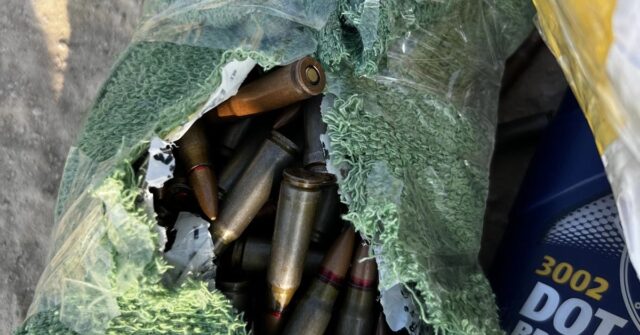On Monday, the Israel Defense Forces (IDF) disclosed a significant discovery during a routine inspection of a humanitarian aid convoy operating within the Gaza Strip. According to an official statement, the unusual activity observed during the convoy’s transit prompted IDF personnel to conduct a security check at a designated checkpoint on the Humanitarian Route that connects northern and southern Gaza. This inspection led to the startling finding of a bag containing firearms ammunition amidst the humanitarian supplies, highlighting potential misuse of aid intended for civilian purposes. Following the discovery, IDF troops apprehended individuals associated with the convoy, including members of the organization overseeing the aid distribution, and those detained were handed over to security agencies for a thorough investigation.
The IDF clarified that the convoy was operating internally within the Gaza Strip, traveling from the northern to the southern regions, and was not utilizing any crossings designated specifically for the entry of humanitarian supplies. This incident underscores ongoing concerns regarding the misuse of humanitarian aid amidst the complex and volatile security dynamics in the region. The situation has garnered increased scrutiny, particularly in light of allegations that significant amounts of aid directed towards Gaza are either being pilfered or left unused. These allegations complicate the international community’s efforts to assist civilians while also maintaining security protocols to prevent resources from falling into the hands of militant groups.
Adding to the tension surrounding humanitarian efforts in Gaza, the Biden administration has expressed its intention to impose an arms embargo on Israel if there is not a noticeable improvement in the humanitarian conditions by the designated deadline of November 13. This warning from the U.S. government reflects rising international pressure on Israel regarding its military operations and the humanitarian implications they entail. Israel maintains that despite ongoing shipments of aid to the region, stringent measures are necessary to screen the materials to ensure that items like ammunition do not end up being utilized by terrorist organizations operating within the Gaza Strip.
The broader context of these developments involves an intricate balance between ensuring the delivery of humanitarian aid and safeguarding against its potential exploitation by hostile actors. The IDF’s discovery of ammunition within a humanitarian convoy not only illustrates the risks associated with aid delivery in contested areas but also raises serious questions about the effectiveness of current oversight and monitoring mechanisms. As Israel contends with the operational realities of its security environment, it faces increasing scrutiny from both international partners and humanitarian organizations, compelling it to justify the measures taken to secure its borders while addressing humanitarian needs.
In the media landscape, the issue is generating significant discourse, with various commentators evaluating the implications of the IDF’s findings for both Israel’s domestic policies and its international relations. Analysts point out that incidents like this could amplify calls for more robust international oversight of humanitarian aid in conflict zones, especially under conditions where the diversion of aid can facilitate sustained violence or bolster militant capabilities. The need for comprehensive strategies that effectively address both security concerns and humanitarian imperatives is becoming increasingly urgent, particularly in light of the upcoming deadline set by the U.S. government.
As the situation develops, the potential consequences of these revelations could have far-reaching impacts on Israel’s operational conduct and its diplomatic engagements. With the international community closely watching, Israel may have to reassess and adapt its approach to ensure that humanitarian efforts are not compromised while still maintaining its core security interests. This ongoing dialogue highlights the complexities of providing aid in conflict regions, where the line between humanitarian assistance and potential security risks continues to blur, leaving all parties involved to navigate a challenging landscape fraught with ethical and practical dilemmas.

